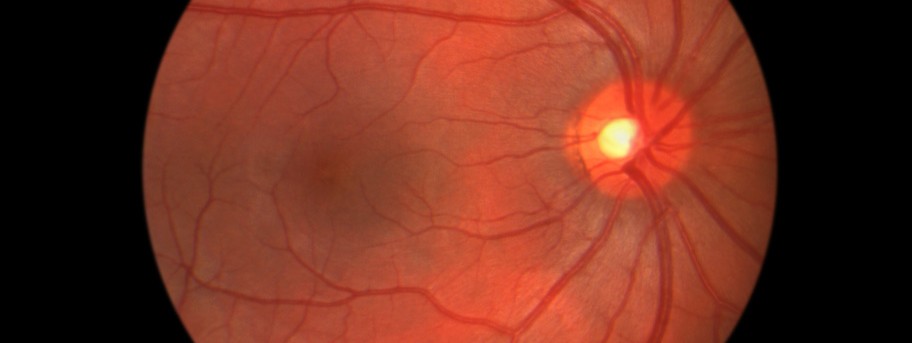The University of Nottingham
 Exchange online
Exchange online
Research Exchange
Vision loss drug tests could slash treatment costs for NHS

Nottingham researchers are leading a study to test the effectiveness of a controversial drug in the treatment of a common loss of vision.
If proved successful in treating wet age-related macular degeneration (AMD), the use of the drug Bevacizumab — commercially branded as Avastin® — could reduce the dose and frequency of patients’ treatment, while potentially slashing the cost of treating the disease for the NHS.
It could prove the case for replacing the drug Ranibuzumab (Lucentis®), which is currently recommended by the National Institute for Health and Clinical Excellence (NICE) for the treatment of wet AMD.
The four-year TANDEM study is being led by Mr Alexander Foss, an honorary special lecturer in the School of Biomedical Sciences at the University Consultant Ophthalmologist at Nottingham University Hospitals NHS Trust.
Mr Foss said: “The currently available evidence all points to the fact that Bevacizumab is of similar effectiveness and safety to Ranibizumab at a fraction of the cost.
“What we really seek to test is whether a lower dose of Bevacizumab can be used in place of a higher dose and whether two-monthly rather than monthly review can maintain the same treatment results.
Bevacizumab works in a similar way to Ranibuzumab and, although it is currently only licensed for use in treating cancer, a handful of health trusts in the UK have agreed that is can be prescribed to treat wet AMD.
The move hit the headlines recently following the decision by pharmaceutical company Novartis — maker of the drug Lucentis — to challenge the decision by seeking a judicial review of the policy to pay for Avastin on the NHS.
However, at a time when the NHS has been told to find £20 billion in savings by 2015, more cost-effective alternatives for commonly used drugs are hugely attractive to cash-strapped local trusts.
Lucentis costs in the region of £740 per injection, while Avastin is a fraction of the cost at £60 per injection. The Nottingham research is aiming to establish whether it could reduce the financial burden on the NHS further by being offered in a smaller dose and at less regular intervals.
Giving the drug every two months would also be beneficial to the patients, many of whom are elderly, who need to travel to hospital for the treatment.
Wet AMD is a common eye condition among people aged 50 and older. Over time, the disease destroys the macula, the part of the eye that provides the sharp, central vision needed for seeing objects clearly, and is the leading cause of vision loss in older adults.
In wet AMD, abnormally high levels of vascular endothelial growth factor (VEGF) are secreted in the eye, promoting the growth of new abnormal blood vessels. Lucentis and Avastin both work by blocking the effect of the VEGF.
The Nottingham researchers are currently seeking to recruit around 2,000 patients aged 50 plus, at a number of centres around the East Midlands, who have recently been referred for wet AMD and who have not received treatment to either eye for the condition during the previous six months.
Two major trials — CATT and IVAN (which also involved researchers from The University of Nottingham) — have reported showing that Avastin and Lucentis are of similar effectiveness. The TANDEM trial is designed to complement these existing trials and in particular to address the important issues of dose (given the safety concern raised with these agents) and frequency of dosing. The trial is designed as a two by two factorial study generating four equal sized groups. One factor is the dose, with half the patients receiving standard dose and the other half receiving a low dose equivalent to half the standard dose and the other factor being frequency, with half the patients being seen monthly and half bimonthly.
Theoretical calculations suggest that half the standard dose should be more than sufficient to generate a full clinical response with an anticipated improved safety profile (complications include such serious condition as strokes) and there is substantial circumstantial evidence that bimonthly, rather than monthly, dosing should prove sufficient to obtain the full clinical benefit.
Mr Greg Fell, Consultant in Public Health and Chairman of the TANDEM Steering Committee, said: “This is an important issue for the NHS, and one where the NHS should be very careful and methodical in how it proceeds. There are genuine unanswered scientific questions which this study will shed light on.”
The TANDEM trial, being conducted through the Clinical Trials Unit based at the University, is due to run until June 2016.
Anyone interested in finding out more about the TANDEM trial can contact Margo Childs, TANDEM trial manager on 0115 884 4923.
Tags: Avastin, Lucentis, National Institute for Health and Clinical Excellence, NHS, Novartis, Ranibuzumab, volunteers, wet age-related macular degeneration
Leave a Reply
Other

Top prize for quantum physicist
A University of Nottingham physicist has won a prestigious medal from the Institute of Physics for […]

Zero carbon HOUSE designed and built by students comes home
Design and construct a low cost, zero carbon, family starter home, transport it to Spain, build […]